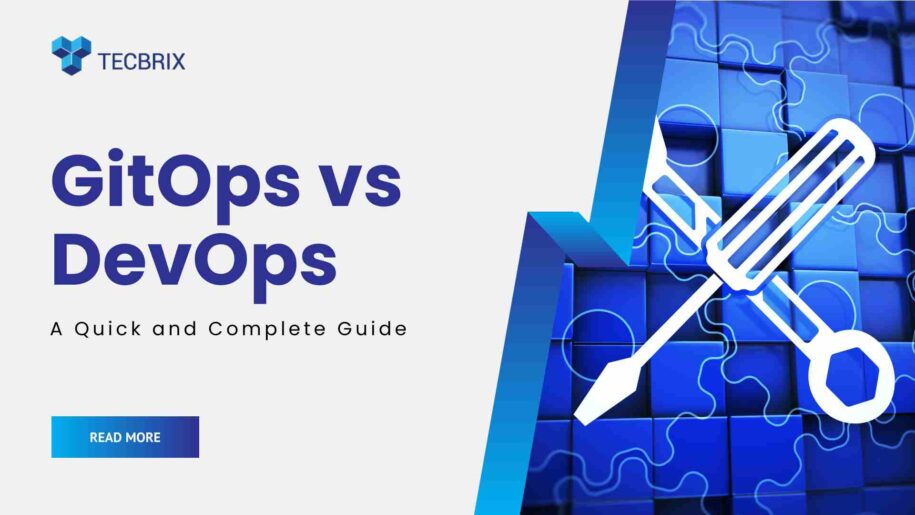There is an ongoing debate in the tech industry about comparing GitOps vs. DevOps and portraying GitOps as a better & more capable alternative to DevOps. When we compare GitOps vs. DevOps, we can observe a range of similarities and differences in the underlying infrastructure of both frameworks.
This blog post will shed light on all the aspects of GitOps vs. DevOps rivalry and give a more detailed and rational picture of the debate.
What is DevOps?
In simple words, DevOps is the combo of development & operations that ensures rich collaboration among development & operations teams to improve performance, better quality, and streamlined workflows throughout the SDLC. These objectives are attained by using various software tools, methodologies, and cultural orthodoxy.
Practically, DevOps is an umbrella term that covers Continuous Integration (CI) and continuous Delivery (CD). The primary objective is aimed at the final outcome of the fast-paced development phase in SDLC. There is a wide variety of tools that address different needs and fuel several processes, including development, testing, monitoring, deployment, maintenance, and delivery.
What Is GitOps?
GitOps is the domain that revolves around the concept of making deployments and updates as easy as managing Git repositories. GitOps is a practice that focuses on the development and management aspects of the SDLC. The approach begins with combined requests and code reviews that later follow and implement infrastructure-as-a-code in the upcoming stages for automation in managing infrastructure.
What Is the Difference between GitOps vs DevOps?
The most significant difference between GitOps vs DevOps is that GitOps depends on a particular resource, Git, as a version control system. Whereas, the latter specifically denotes a culture and methodologies around how development and operations teams should collaborate.
Also Learn: How do Agile and DevOps Interrelate?
The collaboration of the development and operations team in DevOps is intended to acquire success irrespective of the underlying technology or tools. Instead of pushing both concepts frontline of warfare as rivals, it is more rational to perceive both as their patrons. When we look at the broader aspect, there are a few differences between GitOps and DevOps, such as:
Umbrella Domain
GitOps is the sub-domain of DevOps that is centric around continuous delivery. Whereas the domain of DevOps is much broader as it addresses a greater set of problems, including continuous integration, monitoring, testing, control, maintenance, and continuous delivery.
Subjectivity vs Objectivity
GitOps is more subjective. Whereas DevOps involves different roadmaps and approaches that lead to the same destination.
Reliance on Containers
Practically, most DevOps experts refrain from deploying containers. Whereas a greater number of GitOps experts are more committed to containerized applications.
GitOps vs. DevOps – Which one is better?
Non-Technical Aspect
When it comes to resolving any technical issue, there are different approaches to finding the best resolution. It is recommended to understand the requirements and objectives of your organization before jumping into the technical warzone. Some organizations abstain from leveraging the remarkable delivery performance of GitOps, but you should explore the hidden barriers and gateways around your company or industry.
For GitOps to produce promising results, you need to acquire a fully automated system and flexible culture in your department or organization. Implementing a fast-paced deployment framework like GitOps cannot align with the incapable and slow-paced workflows.
For companies having highly regulated and complex organizational structures, transitioning to GitOps in a way that fulfills regulatory constraints while leveraging speed can be troublesome. However, every single change and update is recorded in Git logs. But running analysis and getting insights into these logs demand domain-specific understanding & expertise.
Technical Aspect
As we have discussed above, GitOps relies on a firm prevalent DevOps culture. Therefore, DevOps comes before GitOps. Evaluate whether your processes sustain DevOps efficiently before jumping on the bandwagon to implement GitOps.
Many companies took a quick step when digital transformation made its debut in the global industry. They later found they were too much behind the technical superiority required to adopt digital transformation. They end up worsening their organizational model to trend among the top digital supremacists.
The same is the case with GitOps. It will not be going to eliminate your underlying technical roadblocks and limitations. If your CI/CD pipelines are chocked and collaboration among your development & operations teams is under question, they will continue to remain worse even after a transition to GitOps.
End Words
Some people perceive GitOps as an alternative to the DevOps delivery process. But in reality, it is the sub-domain of the DevOps framework. Additionally, an efficient GitOps framework depends primarily on the overall culture and environment of the DevOps framework. If you don’t have enough soft & hard skills, technical support, and tools to fuel DevOps, GitOps will not be going to do wonders for compromised infrastructure.

